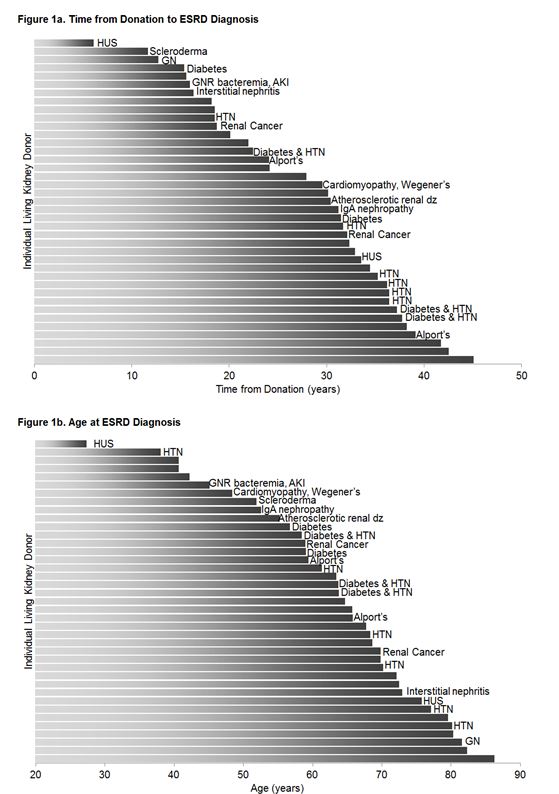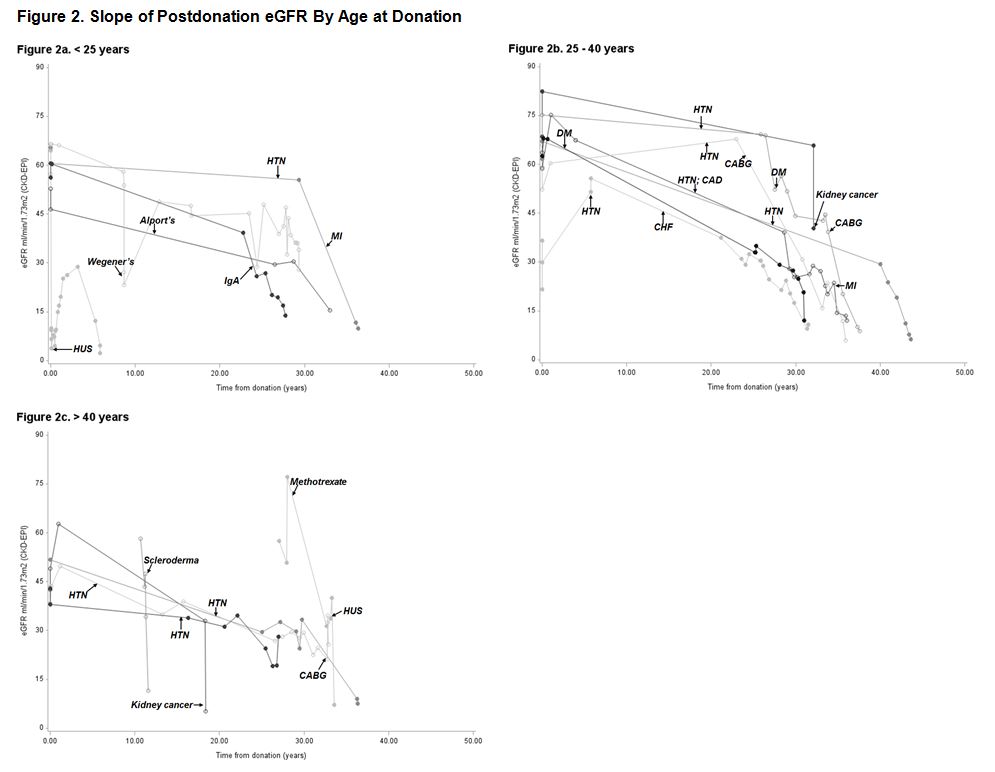Etiology and Timing of ESRD After Kidney Donation.
UofMN, Mpls
Meeting: 2017 American Transplant Congress
Abstract number: 561
Keywords: Donation, Kidney, Renal failure
Session Information
Session Time: 8:00am-10:00am
 Presentation Time: 8:45am-9:00am
Presentation Time: 8:45am-9:00am
Location: Arie Crown Theater
ESRD after kidney donation may occur because of nephrectomy-induced decreased GFR followed by normal age-related decline, by onset of kidney or systemic disease (e.g., HTN), or both. We studied etiology and timing of postdonation ESRD. For those developing ESRD we studied eGFR slope from donation to development of ESRD. Between 1/1963 and 12/2015, we performed 4362 LD tx. ESRD status was ascertained in 4021 LDs (92%); mean f/u, 17±12 yrs. To date, 39 LDs have developed ESRD at a mean of 27±10 yrs (median, 30 yrs) postdonation. Mean age at donation was 35±13 yrs; mean age at ESRD, 62±14 yrs; 26 (67%) were male; 35 (90%) were white; 38 (97%) were related to their recip, 35 (90%) a 1st degree relative. Cause of ESRD was reported for 24 LDs (11 HTN or diabetes (DM); 4 GN; 4 autoimmunue; 2 cancer; and 3 other). Figure 1a shows interval from donation to ESRD and ESRD etiology (those without a dx = unknown). Glomerular and autoimmune disease were a more common cause within 20 years of donation; HTN and DM thereafter. Fig 1b shows age at diagnosis in relation to ESRD etiology – HTN and DM became more common with increasing age. Serial eGFR (CKD-EPI) measurements were available from donation thru ESRD for 18 LDs (fewer measurements in earlier yrs when there was less f/u) (Fig 2). Slope of postdonation eGFR is shown by diagnosis in Figure 2a (donating when <25 yrs); Figure 2b (donating when 25-40 yrs); and Figure 2c (donating when >40 yrs). Similar to Kido et al (n=8) (AJT,2009), we found that for most LDs eGFR was steady or declined gradually followed by a much more rapid decline with onset of new kidney or systemic disease. Conclusion. In our series, 97% postdonation ESRD occurred in those donating to a relative, and the majority of postdonation ESRD occurred late after donation. Early cases were due to glomerular or autoimmune disease, later cases to HTN or DM. Slope of eGFR was relatively stable until a rapid fall with new onset disease.

CITATION INFORMATION: Matas A, Berglund D, Sengupta B, Ibrahim H. Etiology and Timing of ESRD After Kidney Donation. Am J Transplant. 2017;17 (suppl 3).
To cite this abstract in AMA style:
Matas A, Berglund D, Sengupta B, Ibrahim H. Etiology and Timing of ESRD After Kidney Donation. [abstract]. Am J Transplant. 2017; 17 (suppl 3). https://atcmeetingabstracts.com/abstract/etiology-and-timing-of-esrd-after-kidney-donation/. Accessed February 18, 2026.« Back to 2017 American Transplant Congress
